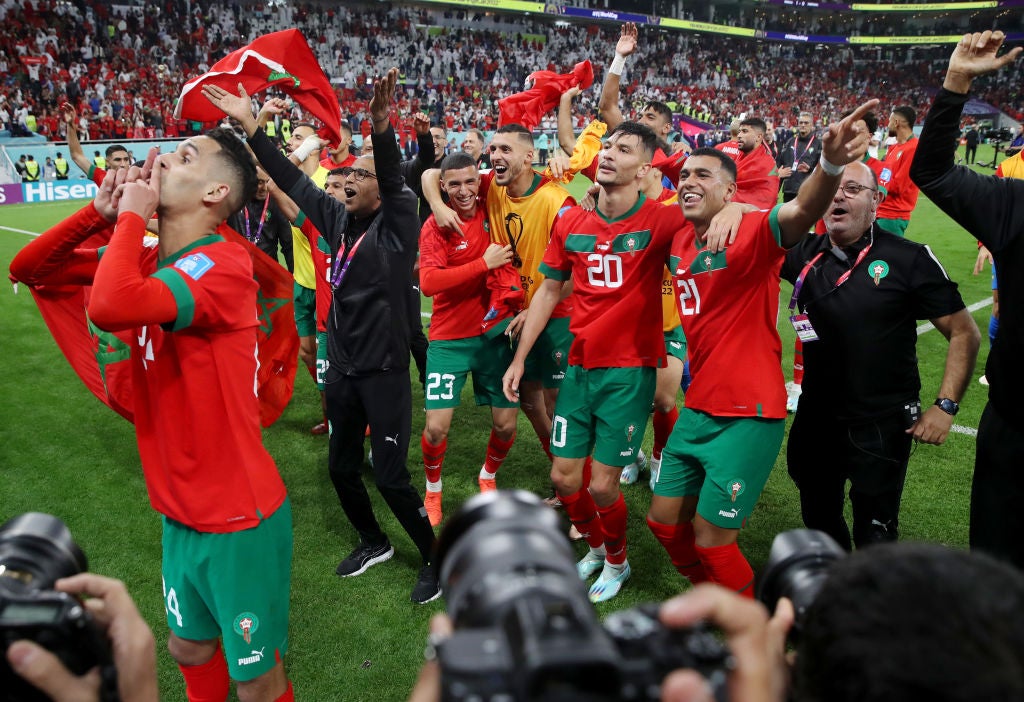New African World Cup qualifying campaign starts after change from ‘nightmare’ setup
CAF nations will have nine World Cup spots to aim for - and possibly a tenth - up from five at Qatar 2022

Your support helps us to tell the story
From reproductive rights to climate change to Big Tech, The Independent is on the ground when the story is developing. Whether it's investigating the financials of Elon Musk's pro-Trump PAC or producing our latest documentary, 'The A Word', which shines a light on the American women fighting for reproductive rights, we know how important it is to parse out the facts from the messaging.
At such a critical moment in US history, we need reporters on the ground. Your donation allows us to keep sending journalists to speak to both sides of the story.
The Independent is trusted by Americans across the entire political spectrum. And unlike many other quality news outlets, we choose not to lock Americans out of our reporting and analysis with paywalls. We believe quality journalism should be available to everyone, paid for by those who can afford it.
Your support makes all the difference.More places for Africa at the 2026 World Cup finals has not lessened the intensity of the qualifying process, often described as the toughest in world football, and which kicks off this week.
Qualification for the tournament in Canada, Mexico and USA has begun in Asia and South America already, and Africa starts its two-year qualifying campaign on Wednesday to determine who will fill the nine automatic places for the continent at the event.
The expansion of the World Cup from 32 to 48 teams means Africa’s quota of finalists is increased from five to nine, with the possibility of another place through a new playoff system that has been introduced.
The long distances to travel, combined with poor and infrequent flight connections, extreme climatic conditions, Spartan facilities and a culture of hostility towards visiting teams have earned Africa’s qualifying process a reputation for being the hardest of the six continental confederations.
Carlos Queiroz, who coached Colombia, Egypt, Iran, Portugal, South Africa and now Qatar, once described the African preliminaries as “a nightmare”.
For the 2026 World Cup, the 54 African entrants were divided into nine groups by CAF with only the winners assured of a place at the finals.
The four best-ranked runners-up will participate in a playoff to determine one team that will go onto the new-style intercontinental playoff tournament, in which one side from each continent will meet in a mini tournament to determine the last two places in the World Cup line-up.
A total of 13 African countries, starting with Egypt in 1934, have played at the World Cup finals. Cameroon are the most frequent participants with eight finals appearances. They begin their campaign with a home match in Douala on Friday against Mauritius before a more testing trip to Libya next Tuesday in Group D.
Meanwhile Morocco, who last year became the first African country to reach the World Cup semi-finals, were supposed to start against Eritrea on Thursday, but the small east African nation has withdrawn.
No reason was given but the hermit country on the horn of Africa has previously seen players defect and seek political asylum when they have gone abroad to compete.
Morocco’s first match in Group E is next Tuesday’s visit to Tanzania, who they also face in January’s Africa Cup of Nations finals in Ivory Coast.
Zimbabwe, kicked out of the last qualifiers because they had failed to settle the contract of a former coach, return from another ban, this time for political meddling in the running of their football association, to face Rwanda away on Wednesday in the first of the 260 African group qualifiers which end in October 2025. Zimbabwe have not played a full international in almost two years and are among 19 countries whose facilities have been condemned as not up to international standard and been forced to move their home games to a neutral venue.
As a result, they will stay in Rwanda after Wednesday’s opening Group C match and host Nigeria there on Sunday.
The others banned from playing at home are Burkina Faso, Burundi, the Central African Republic, Chad, Djibouti, Eswatini, Ethiopia, the Gambia, Guinea, Lesotho, Namibia, Niger, Sao Tome e Principe, Seychelles, Sierra Leone, Somalia, South Sudan and Sudan.
CAF 2026 World Cup qualifying groups
Group A: Egypt, Burkina Faso, Guinea-Bissau, Sierra Leone, Ethiopia, Djibouti
Group B: Senegal, DR Congo, Mauritania, Togo, Sudan, South Sudan
Group C: Nigeria, South Africa, Benin, Zimbabwe, Rwanda, Lesotho
Group D: Cameroon, Cape Verde, Angola, Libya, Eswatini, Mauritius
Group E: Morocco, Zambia, Congo, Tanzania, Niger, Eritrea* (withdrew on 10 November)
Group F: Ivory Coast, Gabon, Kenya, The Gambia, Burundi, Seychelles
Group G: Algeria, Guinea, Uganda, Mozambique, Botswana, Somalia
Group H: Tunisia, Equatorial Guinea, Namibia, Malawi, Liberia, Sao Tome and Principe
Group I: Mali, Ghana, Madagascar, Central African Republic, Comoros, Chad
Join our commenting forum
Join thought-provoking conversations, follow other Independent readers and see their replies
Comments